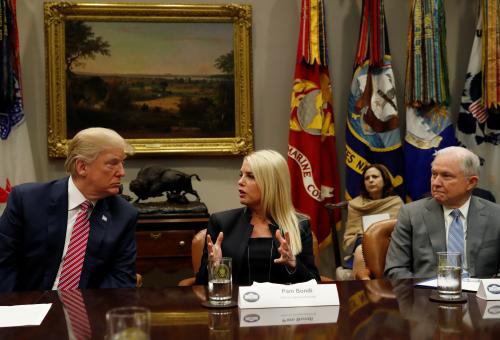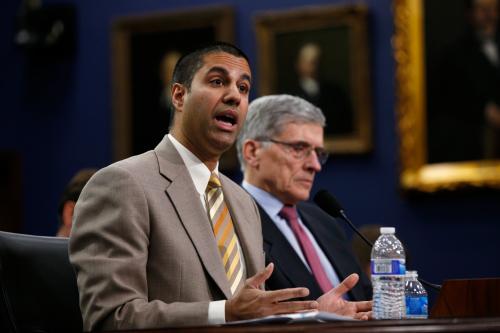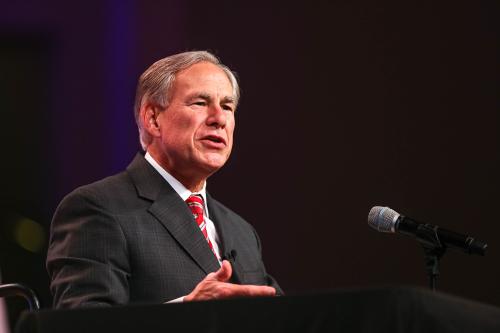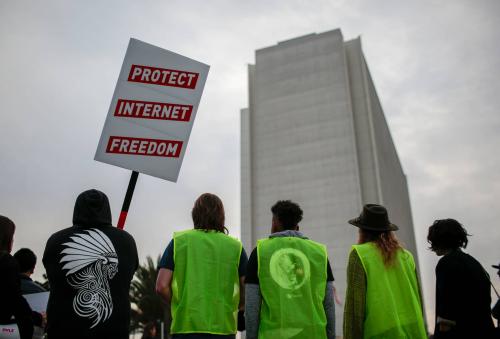On May 28, President Trump issued an “Executive Order on Preventing Online Censorship” stating that the protections conferred by Section 230 of the Communications Decency Act of 1996 “should be clarified.” Among other things, the order called on the Department of Justice to “assess whether any online platforms are problematic vehicles for government speech due to viewpoint discrimination.” This suggests a view that private entities should be compelled to serve as viewpoint-neutral vehicles for dissemination of “government speech.” And last June, Sen. Josh Hawley (R-Mo.) introduced S.1914, a bill that would have amended Section 230 so that, as a press release from Sen. Hawley’s office explained, “Big tech companies would have to prove to the FTC by clear and convincing evidence that their algorithms and content-removal practices are politically neutral.” (Sen. Hawley has also introduced a more recent bill that would amend other aspects of Section 230.)
This regulatory push comes as part of a broader attack on Section 230, the foundational statute that protects internet companies from being liable for content posted by third parties. If your neighbor sends a tweet asserting that you are a bank robber, you could pursue a defamation claim against the neighbor but not against Twitter. The fact that Twitter didn’t preemptively detect and block the defamatory tweet wouldn’t saddle Twitter with any legal liability. By freeing web sites to engage in content moderation addressing issues such as disinformation and hate speech without taking on liability for falling short of perfect, Section 230 has been a key driver of the innovations that led to today’s enormous variety of online sites and services that rely on user-generated content. The pressure to change Section 230 hasn’t only come from people on the political right: Some Democrats, citing concerns about disinformation and hate speech as opposed to political bias, have also suggested amending or repealing the law.
The original Fairness Doctrine
There is nothing in Section 230 that requires social media companies and other online sites that host third party content to be viewpoint neutral. But for much of the second half of the 20th century, U.S. broadcasters operated under the FCC’s “fairness doctrine,” which required them to present a balanced range of perspectives on issues of public interest. The FCC successfully defended the doctrine’s constitutionality in Red Lion Broadcasting Co., Inc. v. FCC, a landmark 1969 Supreme Court decision arising from an FCC enforcement action against the operator of a Pennsylvania radio station. “It does not violate the First Amendment,” the Court wrote, “to treat licensees given the privilege of using scarce radio frequencies as proxies for the entire community, obligated to give suitable time and attention to matters of great public concern.”
But by the second half of the 1980s both the broadcasting landscape and the FCC’s views had changed. Growth in the number of television and radio stations meant that the scarcity cited by the Supreme Court in Red Lion Broadcasting was no longer a concern. The FCC’s own general counsel concluded that the rules intended to enforce fairness were “no longer necessary to achieve diversity of viewpoint.” In 1987 the FCC commissioners voted unanimously to abolish the fairness doctrine on the grounds that, as the chairman explained, “We seek to extend to the electronic press the same First Amendment guarantees that the print media have enjoyed since our country’s inception.”
Today, thanks to the internet, the number of sources from which people can access information is limitless. While there are many legitimate criticisms that can be leveled at today’s internet ecosystem, a lack of opportunity to access a diverse range of information sources and viewpoints is not one of them. That is one reason why the recent trend to push for regulation that would attempt to bring back something resembling the fairness doctrine for online content is all the more concerning.
Private companies and the First Amendment
As private entities, social media companies are not bound by the First Amendment, which constrains the government from “abridging the freedom of speech.” Ironically, if the government were to enact what amounts to an internet fairness doctrine to attempt to force large social media companies (or for that matter any other private online content providers, large or small) to be “politically neutral,” however that might be defined, that itself would be a violation of the First Amendment.
Even in its mid-20th century heyday, the fairness doctrine was constitutionally suspect, as it purported to leave in government hands the power to decide what constituted balanced coverage of issues of public interest by private broadcasters. It only survived Supreme Court review in the 1960s because the limited number of available television and radio stations gave rise to concerns that the public might be denied access to a multiplicity of viewpoints. That rationale had evaporated by the 1980s. In 1987, the year the fairness doctrine was abolished, the U.S. broadcast market had grown to include “more than 1,300 television stations and more than 10,000 radio stations,” and “radio listeners in the biggest 25 markets receive[d] an average of 59 radio stations.”
Under the First Amendment, each social media platform or other privately-operated web site is free to welcome a diverse range of viewpoints or, alternatively, to preferentially welcome viewpoints from either the political right or the political left. And while there are plenty of internet sites that individually offer a politically narrow set of perspectives, the internet as a whole certainly does not prevent users from accessing multiple viewpoints.
As a result, we now live in a world with a level of diversity of information sources that would have been incomprehensible three decades ago. Of course, for all of the many benefits of the contemporary online environment, there is also plenty not to like, including the toxicity, misinformation and disinformation, and the use of the internet for criminal purposes. We can and should seek solutions to build a healthier, safer internet. But those solutions should not include—and under the First Amendment, cannot include—vastly increased state control over the online information ecosystem through punishment of internet companies not meeting the government’s own interpretation of “neutrality.”










Commentary
Why creating an internet “fairness doctrine” would backfire
June 24, 2020